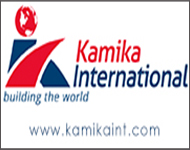- Groundbreaking Ceremony Marks Start of Sh50 Billion MTRH Construction Project
- TANROADS-World Bank Alliance Powers Massive Road and Airport Upgrades Across Tanzania
- Kenya Breaks Ground on Sh5 Billion China-Kenya International Commerce Center in Nairobi
- Construction Begins on $2.15 Billion Uvinza–Musongati Railway Project
- Kenya Secures Chinese Funding for Sh5 Billion Nithi Bridge Reconstruction
- Construction Nears for ELCT Facility Backed by Samia’s 250 Million Boost
- KeNHA Kicks Off Construction of Major Kenya-South Sudan Road Project with AfDB Support
- Tanzania Government Allocates 100 Billion Shillings for Bridge Constructions in Lindi
- $46 Million Deal Signed for Crucial Isiolo-Mandera Road Construction Project
- Tanzania Government Set to Sign Agreement for Dodoma Stadium Construction
Tanzania: Construction Booms As Public, Private Sector Investments Soar
TANZANIA has in recent years seen unprecedented growth in construction sector, with mushrooming new houses, multi-storey buildings, roads and bridges, the trend that has contributed to surging demand for the building materials.
Increased government funding on infrastructure development in almost every financial year has acted as an incentive for continued inflows of investments in the construction industry. The government has in the 2013/14 financial year increased spending on infrastructure to 2.16trn/- compared to 1.94trn/- in the previous fiscal year.
Activities in the construction sector have grown at an annual rate of 8 per cent over the past five years. For the Tanzanian economy to grow, it needs well developed transport infrastructure like roads, bridges, railways as well as efficient telecommunication network.
Other important features like residential properties, commercial buildings, hospitals, fibre optic cables and service centres are equally important. The Confederation of Tanzania Industries (CTI) Director of Policy and Research Mr Hussein Kamote said in an interview with the 'Business Standard' in Dar es Salaam last week that, "The increased inflows of investment in cement production is good news for the country's economy and should be given all necessary supports,"
He added, "There is a direct relationship between construction sector and the growth of national income which is also a sign of improved living standards of the people," Mr Kamote noted, adding that the local demand for cement has been growing because of increased public and private construction activities.
Domestic demand, currently stands at 4 million tonnes and has been growing at an average annual rate of 10 per cent over the past five years to 2012. Apart from the huge local demand, the country's location--surrounded by many land locked countries, provides grand opportunity for investors to rush for the cement manufacturing business to supply to neighbouring markets.
Abundant availability of raw materials like limestone, sand, shale, clay and iron ore particularly along the coastline, reduces production costs and is among the major factors that attract cement investments in the country. Increased government spending in the energy sector in gas exploration in particular for generating electricity has also contributed to attracting investments in the cement industry.
For 2013/14, a total of 1.43tri/- has been allocated compared to 731.8bn/- set in the preceding fiscal year. Mr Kamote said the coming in of new players in the cement production will stiffen competitions that will increase efficiency and pull down prices of the commodity in the market.
It is undisputed fact that cement industry contributes to the development of important infrastructural facilities needed to speed up economic development of any country in the world, Tanzania included. Cement in its raw form technically has no ability, but it is the key ingredient for making concrete as well as the foundation of any construction purposes.
Concrete is used more than any other man-made material and is second only to water as the most used consumer good, not only in construction but in all walks of human life.
Currently, Tanzania has an estimated production capacity of 3.5 million tonnes per annum shared mainly among big producers of Twiga, Simba and Tembo cement brand.
New players expected in the cement industry include Dangote Cement, Nigeria industry conglomerate and the new entrant in the country and the East African regional cement market. It is planning for a 2 million gas fired cement plant in the country as part of their pan-African strategy to expand across the continent.
Athi River Mining, with their 2012 commissioned plant in Dar es Salaam intends to commission a new plant in Tanga by mid-2013 which will add local production capacity by 1.2 million tonnes.
Lake Cement with a joint venture between local investors in the tune of 49 per cent and Banco India 51 per cent intends to commission by 2014 with a capacity of 500,000 tonnes per annum.
The Chinese firm Lee Building Minerals has started construction of 12.5 million US dollars cement factory in Lindi with a capacity of 300,000 tonnes per annum. Similarly, the Pakistan investors plan to invest in cement manufacturing in Tanzania with the intent to reduce imports from Pakistan.
Posted on : 30 Nov,-0001
Buildmart is Africa's leading directory and market news website for the building and construction industry | Kenya | Tanzania | Rwanda | Ethiopia
Exhibitions In Africa
- 27th Buildexpo Kenya 2026
KICC, Nairobi, kenya
08 - 10, July 2026 - 11th Afriwood Kenya 2026
KICC, Nairobi, kenya
08 - 10, July 2026 - 11th LightExpo Kenya 2026
KICC, Nairobi, kenya
08 - 10, July 2026 - 10th Minexpo Africa 2026
KICC, Nairobi, Kenya
08 - 10, July 2026 - 27th Buildexpo Tanzania 2026
Diamond Jubilee Expo Center, Dar-es-Salaam, Tanzania
23 - 25, Sep 2026 - 10th Afriwood Tanzania 2026
Diamond Jubilee Expo Center, Dar-es-Salaam, Tanzania
23 - 25, Sep 2026 - 10th LightExpo Tanzania 2026
Diamond Jubilee Expo Center, Dar-es-Salaam, Tanzania
23 - 25, Sep 2026 - 10th Minexpo Tanzania 2026
Diamond Jubilee Expo Center, Dar-es-Salaam, Tanzania
28 - 30, Oct 2026





















